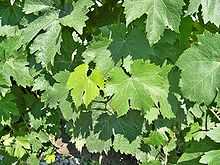Piquepoul
| Piquepoul blanc | |
|---|---|
| Grape (Vitis) | |
 | |
| Piquepoul in Viala & Vermorel | |
| Color of berry skin | Blanc |
| Species | Vitis vinifera |
| Also called | Picpoul, Picpoul blanc, Picpoul de Pinet |
| Origin | France |
| Notable regions | Languedoc |
| Notable wines | Picpoul de Pinet |
| Hazards | Fungal diseases |
| Piquepoul Gris | |
|---|---|
| Grape (Vitis) | |
| Color of berry skin | Gris |
| Species | Vitis vinifera |
| Also called | Piquepoul rose, Picpoul, Picpoul gris |
| Piquepoul noir | |
|---|---|
| Grape (Vitis) | |
 | |
| Piquepoul Noir grapes | |
| Color of berry skin | Noir |
| Species | Vitis vinifera |
| Also called | Picpoul, Picpoul noir |

Piquepoul, Picpoul, or Picapoll is a variety of wine grape grown primarily in the Rhone Valley and Languedoc regions of France. It exists both in dark-skinned (Piquepoul noir) and light-skinned (Piquepoul blanc) versions, as well as a very little grown Piquepoul gris. Piquepoul blanc is the most common of the Piquepouls, with 1,000 hectares (2,500 acres) cultivated in France in 2000, and an increasing trend.[1]
Piquepoul tends to bud late and has some sensitivity to oidium. Its name means "lip-stinger" and refers to the high acidity of the grapes.[2]
History
Piquepoul has a long history in the Languedoc region, and along with Cinsaut and Clairette blanche is one of the oldest domestic grape varieties of that region. It was blended with Clairette blanche to produce the wine Picardan in the 17th & 18th centuries.[1]
After the Great French Wine Blight, when large shifts in varieties planted took place, Piquepoul lost popularity due to its susceptibility to fungal diseases such as oidium and its low yield.

Piquepoul wines
In Languedoc, Piquepoul blanc is used both for blending and for varietal wines. Red wines produced from Picpoul noir are high in alcohol, are richly scented, but have a very pale colour, which has made the variety more popular as a blending ingredient than as a producer of varietal wines.[1]
Both the blanc and noir versions of Piquepoul are permitted blending grapes for the production of Châteauneuf-du-Pape. However, in 2004 only 0.15% of the appellation's surface was planted with the Piquepoul varieties.[3]
Picpoul de Pinet
Picpoul de Pinet [4] is a designation or cru which may be used within the Languedoc appellation for white wines made exclusively from Piquepoul blanc in the communes Pinet, Mèze, Florenzac, Castelnau-de-Guers, Montagnac and Pomérols.[5] Picpoul de Pinet and Clairette blanche are the primary varietals used in the manufacture of Noilly Prat, the well-known Languedoc vermouth.
The wines are green-gold in color, full-bodied, and show lemon flavours. Modernization of the winemaking has led to increased interest in these wines.[6]
Synonyms
Synonyms for Piquepoul blanc include Avello, Avillo, Extra, Feher Piquepoul, Languedocien, Picapoll, Picapolla, Picapulla, Picpoul, Picpoul de Pinet.[7]
Synonyms for Piquepoul gris include Avillo, Languedocien, Picapulla, Picpoul, Pikepul Seryi, Piquepoul rose, Szürke Piquepoul.[8]
Synonyms for Piquepoul noir include Avillo, Kek Piquepoul, Languedocien, Pical, Pical negro, Pical Polho, Picalpolho, Picapoll, Picapoll Negro, Picapouia, Picapouya, Picapulla, Picpouille, Picpoul, Picpoule, Picquepoul, Pikepul Chernyi, Pique Poule, Piquerette noire.[9]
Picpoul is also a synonym for the variety Folle blanche, which has no known relationship to Piquepol.
References
- ↑ 1.0 1.1 1.2 Jancis Robinson, ed. (2006). "Picpoul". Oxford Companion to Wine (Third Edition ed.). Oxford: Oxford University Press. pp. 524–525. ISBN 0-19-860990-6.
- ↑ J. Robinson Vines, Grapes & Wines pg 202 Mitchell Beazley 1986 ISBN 1-85732-999-6
- ↑ www.chateauneuf.dk: Grapes, accessed on June 18, 2008
- ↑ http://www.picpoul-de-pinet.com/english/index2.html Picpoul de Pinet website
- ↑ INAO: Appellation rules for Languedoc, updated until September 30, 2007
- ↑ Jancis Robinson, ed. (2006). "Picpoul de Pinet". Oxford Companion to Wine (Third Edition ed.). Oxford: Oxford University Press. p. 525. ISBN 0-19-860990-6.
- ↑ Vitis International Variety Catalogue: Piquepoul blanc, accessed on June 18, 2008
- ↑ Vitis International Variety Catalogue: Piquepoul gris, accessed on June 18, 2008
- ↑ Vitis International Variety Catalogue: Piquepoul noir, accessed on June 18, 2008